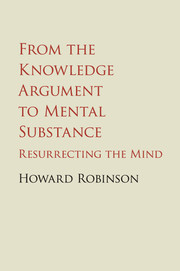Book contents
- From the Knowledge Argument to Mental Substance
- From the Knowledge Argument to Mental Substance
- Copyright page
- Dedication
- Contents
- Preface
- Book part
- Part I The power of the knowledge argument
- Part II Why physicalism entails epiphenomenalism
- 9 Reductionism and the status of the special sciences
- 10 Vagueness, realism, language and thought
- 11 Composite objects, the special sciences, conceptualism and realism
- 12 Why there are (probably) no physical individuals
- 13 Dennett and the human perspective
- Part III Arguments for mental substance
- Bibliography
- Index
9 - Reductionism and the status of the special sciences
from Part II - Why physicalism entails epiphenomenalism
Published online by Cambridge University Press: 05 February 2016
- From the Knowledge Argument to Mental Substance
- From the Knowledge Argument to Mental Substance
- Copyright page
- Dedication
- Contents
- Preface
- Book part
- Part I The power of the knowledge argument
- Part II Why physicalism entails epiphenomenalism
- 9 Reductionism and the status of the special sciences
- 10 Vagueness, realism, language and thought
- 11 Composite objects, the special sciences, conceptualism and realism
- 12 Why there are (probably) no physical individuals
- 13 Dennett and the human perspective
- Part III Arguments for mental substance
- Bibliography
- Index
Summary
- Type
- Chapter
- Information
- From the Knowledge Argument to Mental SubstanceResurrecting the Mind, pp. 147 - 159Publisher: Cambridge University PressPrint publication year: 2016



